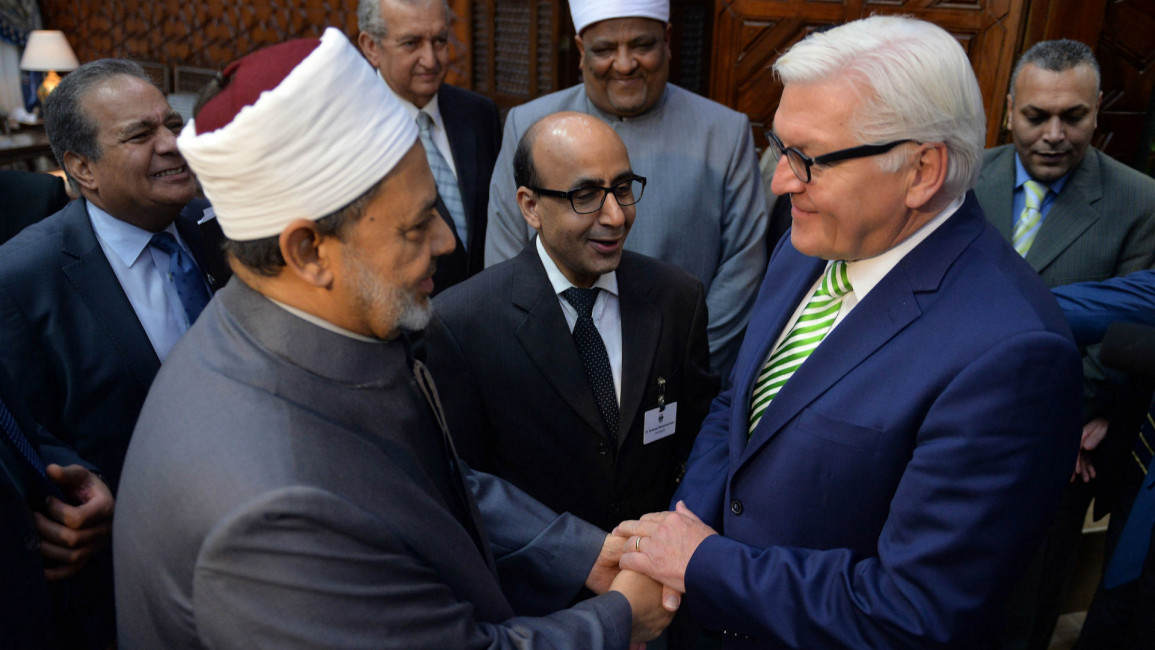Pope to meet Egypt's top Muslim cleric
Pope to meet Egypt's top Muslim cleric
Pope Francis will meet Sheikh Ahmed al-Tayeb, grand imam at the regime-backed al-Azhar Mosque in Cairo, marking a return to normalisation between faiths.
2 min read
Ahmed al-Tayeb was appointed to his role by former President Hosni Mubarak [Getty]
Pope Francis will meet Egypt's top Muslim cleric in an unprecedented encounter at the Vatican next Monday.
Sheikh Ahmed al-Tayeb, the grand imam of Cairo's al-Azhar Mosque, will have an audience with the leader of the world's 1.2 billion Catholics at St Peter's Basilica, Father Federico Lombardi told AFP.
"This audience is being prepared and has been scheduled for Monday," he said. "It will be a first."
The visit marks the restoration of cordial relations between the two faiths, with al-Azhar widely viewed as the Sunni Muslim world's leading Islamic institution.
Ties between Catholicism and Muslims soured under Pope Benedict XVI - Francis' predecessor - when he was perceived to describe Islam as a violent religion in 2006.
Dialogue resumed three years later but was suspended again by al-Azhar in 2011 when Benedict called for the protection of Christian minorities after a bomb attack on a church in Alexandria.
The comments were viewed by the Muslim body as meddling in Egypt's internal affairs.
Relations have steadily improved since Francis became pope in 2013 with inter-faith dialogue near the top of his agenda.
This is something he underlined with a personal message to the Muslim world to mark the end of the first month of Ramadan of his pontificate.
However Sheikh Ahmed al-Tayeb is not without controversy.
He came under fire for comparing boycotting elections - not viewed as fair by many international monitoring groups - in Egypt to "disobeying one's parents".
Tayeb, a supporter of the military-backed Egyptian regime that came to power after overthrowing President Mohamed Morsi in 2013 has spoken of a need to develop a new "religious discourse" in Egypt.
"We need to focus on human values and concepts we need in our societies, such as tolerance and social justice," he said.
"There is a plot against Islam and the Egyptian dream, that aims to destabilise the country and its people."
Egypt's revolutionary President Gamal Abdel Nasr brought al-Azhar university under state control with most of its leaders and scholars being appointed by the government.
Ahmed el-Tayeb himself was appointed by Mubarak and was supportive of the current President Abdel Fattah al-Sisi's military coup in 2013.
Over the years, Egyptian religious traditions such as Sufism and its discourse was appropriated by the state in an attempt to build popular support for the government, and lend the authorities spiritual credibility.
On the other hand, many of al-Azhar's students are supportive of former president Mohammad Morsi, with the students holding massive sit-ins after the military coup.
Students have also reported harassment and abuse at check points in the university.
Sheikh Ahmed al-Tayeb, the grand imam of Cairo's al-Azhar Mosque, will have an audience with the leader of the world's 1.2 billion Catholics at St Peter's Basilica, Father Federico Lombardi told AFP.
"This audience is being prepared and has been scheduled for Monday," he said. "It will be a first."
The visit marks the restoration of cordial relations between the two faiths, with al-Azhar widely viewed as the Sunni Muslim world's leading Islamic institution.
Ties between Catholicism and Muslims soured under Pope Benedict XVI - Francis' predecessor - when he was perceived to describe Islam as a violent religion in 2006.
Dialogue resumed three years later but was suspended again by al-Azhar in 2011 when Benedict called for the protection of Christian minorities after a bomb attack on a church in Alexandria.
The comments were viewed by the Muslim body as meddling in Egypt's internal affairs.
Relations have steadily improved since Francis became pope in 2013 with inter-faith dialogue near the top of his agenda.
This is something he underlined with a personal message to the Muslim world to mark the end of the first month of Ramadan of his pontificate.
However Sheikh Ahmed al-Tayeb is not without controversy.
He came under fire for comparing boycotting elections - not viewed as fair by many international monitoring groups - in Egypt to "disobeying one's parents".
Tayeb, a supporter of the military-backed Egyptian regime that came to power after overthrowing President Mohamed Morsi in 2013 has spoken of a need to develop a new "religious discourse" in Egypt.
"We need to focus on human values and concepts we need in our societies, such as tolerance and social justice," he said.
"There is a plot against Islam and the Egyptian dream, that aims to destabilise the country and its people."
Egypt's revolutionary President Gamal Abdel Nasr brought al-Azhar university under state control with most of its leaders and scholars being appointed by the government.
Ahmed el-Tayeb himself was appointed by Mubarak and was supportive of the current President Abdel Fattah al-Sisi's military coup in 2013.
Over the years, Egyptian religious traditions such as Sufism and its discourse was appropriated by the state in an attempt to build popular support for the government, and lend the authorities spiritual credibility.
On the other hand, many of al-Azhar's students are supportive of former president Mohammad Morsi, with the students holding massive sit-ins after the military coup.
Students have also reported harassment and abuse at check points in the university.



